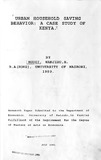| dc.description.abstract | Like many other developing countries, Kenya has faced problems in
financing domestic investment. Despite a high proportion of GDP
having been put into saving, Kenya has not met the investment
finances fully. It· has had to rely on foreign savings to
supplement domestic resources. However, factors working on both
demand and supply side of foreign savings have made the country
put more emphasis on mobilization of domestic saving.
Saving is a complex socio-economic phenomenon. It is therefore
necessary to understand the factors behind saving behavior. The
main objective of the study is to examine the determinants of
saving behavior of urban households in Kenya. Six towns are
considered that is Nairobi, Mombasa, Kisumu, Nakuru and ,
Eldoret. An econometric study is carried out to test the
explanatory power of various determinants of saving behavior and
to see the effects of alternative policies that can be used in
mobilizing savings. Due to data problems, the analysis lays
greater emphasis on financial savings.
Using OLS technique, savings funct ions for urban households are
fitted at urban center level. From the empirical work the
following conclusion are arrived at: income is an important
variable in savings function for urban households where saving
is a decreas ing non-linear funct ion of income; education and
number of income contributors play insignificant role in
explaining variations in financial savings, movement towards
equitable distribution of income means increasing financial
savings thus aggregate savings and, reducing family size will
leave more income for saving purpose.
From these results various policy implications are drawn. First,
with the population control policy the country will achieve a lot
in mobilizing domestic personal savings in urban areas. Secondly,
it is necessary that the government ensures equitable
.distribution of income in urban areas. Thirdly, although the
effects of education policy may be indirectly felt on saving,
education policy will not exert direct effect on savings. | en |

